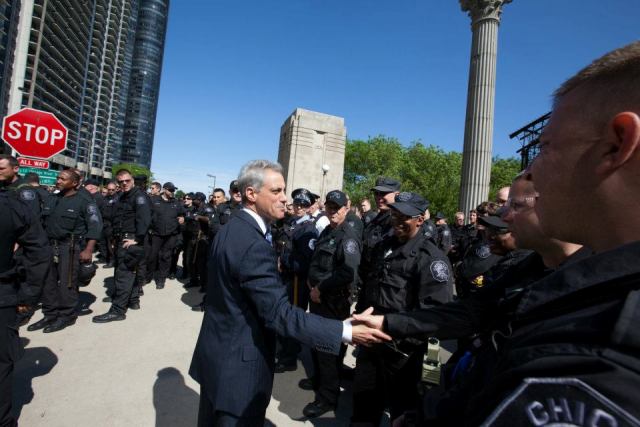Rahm Holds Firm On No Taxes, Fee Hikes In 2013 City Budget
By Chuck Sudo in News on Oct 10, 2012 7:30PM

Photo by Brooke Collins, City of Chicago.
Mayor Rahm Emanuel presented his 2013 City budget during a special session of City Council this morning. The $8.3 billion budget calls for major investments in public safety programs, neighborhood services and children’s programs, re-invest $15 million into the city’s “rainy day fund,” hiring 475 new police officers, and eliminate the “head tax” charged on companies with more than 50 employees by the end of next year, with no new tax hikes or fee increases.
So how does Emanuel plan to balance a budget deficit that was $298 million in September? He’s going to cut, cut and cut some more.
The budget calls for:
- $67 million of spending reforms and cuts, including $10 million in savings from strategic sourcing on city contracts and $5.8 million in information technology reforms
- $45 million in personnel savings including $20 million in layoffs, attrition and vacancy sweeps, and $5 million from partnerships with labor
- $70 million in healthcare savings
- $10 million from TIF reform
- $24 million in improved debt collection
- $42 million in additional revenue growth
- $40 million from refinancing long-term debt.
What the budget doesn’t address is the looming pension bomb. Emanuel did, however, reference it and the need for pension reform in Springfield in a statement released by his office and his speech to City Council, as he kicked that particular can down the road.
We have all worked hard to get the City to a point where we can balance our budget, invest in our children, improve our neighborhood services, make fundamental reforms to our government, strengthen our commitment to public safety, all while holding the line on taxes. But if we do not come to terms with our past and fix the crisis surrounding our pension payments, our work will be for naught. The residents of Chicago elected us to tell the hard truths so that we can make the tough decisions. We need to be honest with everyone about the challenges we face and the difficult choices we must make to solve them.”
If pension reform is not achieved by the Illinois Legislature (and it’s supposedly on the agenda for their January legislative session) Chicago’s pension obligations will increase to $1.2 billion in four years—more than 20 percent of the city budget. That would require a 150 percent increase in property taxes to cover.